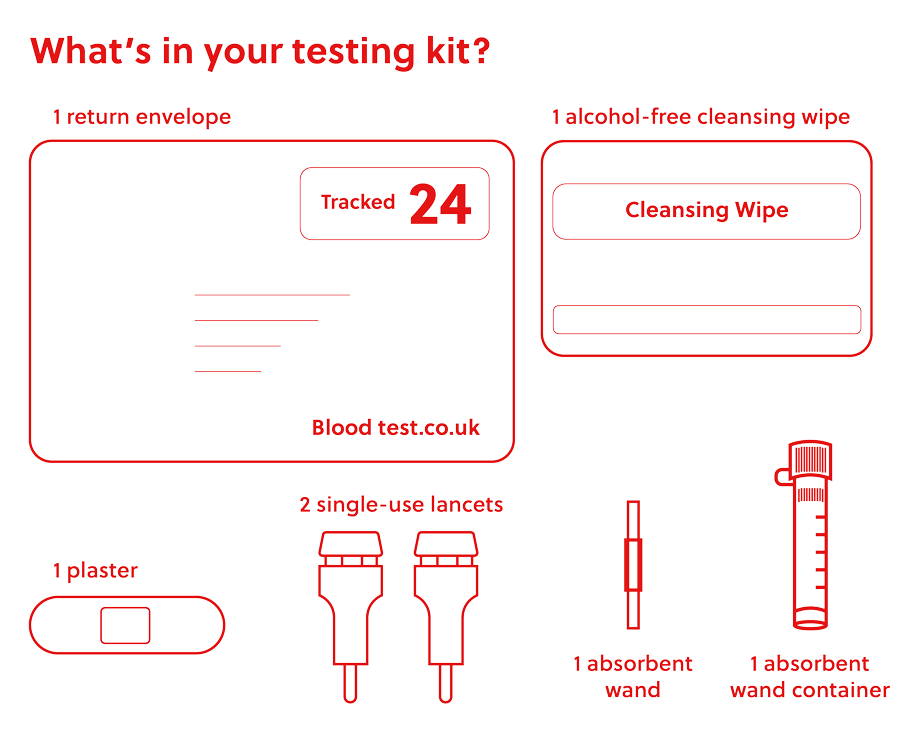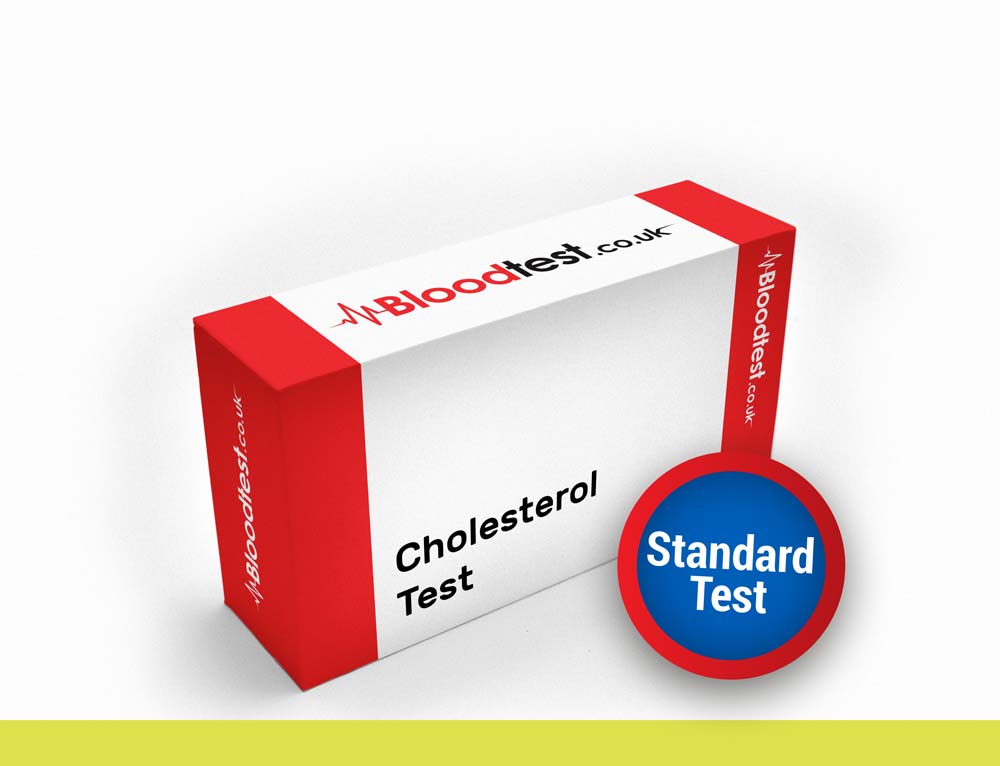Description
Cholesterol Blood Testing
Our body’s need cholesterol to function in a healthy manner. It is vital for the formation of cell membranes, certain hormones and vitamin D.
Cholesterol is a waxy fat like substance which is transported around our bodies by lipoproteins which are produced in our liver. There are two major lipoproteins which are high density lipoprotein (HDL) and low density lipoprotein (LDL)
If you have too much LDL (bad cholesterol) this may lead to ill health problems such as heart disease which may cause health problems such as a a heart attack or stroke.
Most people are unaware they have too much LDL (bad cholesterol) until it is too late. That is why a blood test to monitor your cholesterol is important.
HDL (good cholesterol) helps to return the LDL (bad cholesterol) back to your liver and be naturally removed out of your body. Healthy levels of HDL reduces your risk of heart disease.
Causes of high Cholesterol
- Diet: consuming foods high in trans fats (often found in packaged snacks and deserts) and saturated fats (often found in full fat dairy products or fatty meats) may increase your risks of suffering with high LDL cholesterol
- Lack of exercise: exercise may boost your HDL cholesterol
- Smoking: may lower your HDL cholesterol levels.
- Obesity: having a BMI (Body Mass Index) of 30 or more puts you at high risk of having high cholesterol
- Alcohol: drinking excess alcohol may increase cholesterol
- Age: as we age our livers have more difficulty in removing the LDL cholesterol
- Genetics: In some cases family genetics may also be a contributing factor.
- Health conditions: There are also health conditions which can cause unhealthy cholesterol such as , hypothyroidism, diabetes, chronic kidney disease, lupus and HIV/AIDS
- Medications: some medications such as those used for high blood pressure, cancer, acne may increase cholesterol levels
How to help lower your Cholesterol
In some cases, adopting a change in lifestyle habits may improve your cholesterol level or prevent you from having a high cholesterol.
- Diet: Aim to consume a small amount of unsaturated fats opposed to saturated fats. Instead of frying foods try to steam, grill, poach, microwave or boil foods. Aim to consume at least 30g of fibre a day, along with at least 5 portions of different types of fruit and vegetables.
- Exercise: Exercise for at least 30 minutes at least 5 times a week. Exercise such as brisk walking, cycling and swimming are good to start with.
- Smoking: Stop smoking,
- Weight: aim for a healthy BMI (Body Mass Index)
- Alcohol: Drink moderately aiming to keep below the recommended units per week (14 units or less per week)
Testing for cholesterol health
The test can be performed using a small amount of blood from a finger prick which you can do yourself.
How often should I have a cholesterol blood test?
We recommend checking your cholesterol levels annually. Or, if suffering with a high cholesterol and changes have been made with diet and lifestyle, retest three months later.
Other Questions
- Regularly eating high saturated fat foods
- Obesity
- Smoking
- Family history of high cholesterol
- Inactive lifestyle
- Sedentary lifestyle
- Poor diet
- Diet lacking in fruit and vegetables
- Family history of cardiovascular disease
- Drinking excess alcohol regularly
- Having Type 2 diabetes
- High blood pressure
This blood test is to check on:
- Total Cholesterol
- LDL (Low Density Lipoprotein)
- HDL (High Density Lipoprotein)
- Triglycerides
- Non-HDL (High Density Lipoprotein) Cholesterol
For best results (if medically suitable) it is advisable to fast (water is allowed) 12 hours prior to the test which needs to be taken first thing in the morning and posted on the same day on a Monday, Tuesday,or Wednesday.
Collection method: Finger prick
Results available: 2-3 days after the sample has reached the laboratory.
Cholesterol
Your liver makes cholesterol and can be found in many foods you eat such as dairy, meats and fish.
There are two main types of cholesterol: HDL (High Density Lipoprotein) and LDL (Low Density Lipoprotein).
Triglycerides
Triglycerides are the most common type of fat in your body. They come from foods we eat (such as dairy, meat,oils) or made by our liver.
Any excess calories your body doesn’t need straight away is converted into Triglycerides and stored in your fat cells to be used when needed for energy.
LDL (Low Density Lipoprotein)
LDL is known as the bad cholesterol as it can block up our blood vessels causing them to narrow. Sometimes a clot can form and get stuck in these narrow vessels leading to a heart attack.
HDL (High Density Lipoprotein)
HDL is known as the good cholesterol as it helps remove other forms of cholesterol from your bloodstream. Higher levels of HDL are associated with lower risk of heart disease.
Non-HDL (High Density Lipoprotein) Cholesterol
Non-HDL cholesterol is your total cholesterol minus your HDL. The higher the number of the Non-HDL cholesterol may be indicative that you could be at higher risk of developing cardiovascular disease.
How it Works
1. Order a Test
Answer the Questions about why you’re taking the test.
Our nurse will contact you for dates, so they can take your blood sample at your home.
Our nurse will then send your sample to our laboratory.
2. Our laboratory team run the tests
Our skilled laboratory staff conduct your blood tests in a clean and secure environment, ensuring accuracy and reliability.
Each test follows strict protocols to maintain the highest quality standards.
3. Receive Your Results within 7 days
We will email you to inform you that your blood test results are ready.
The email will have a PDF report attached, sent directly to your inbox.
4. Monitor your levels over time
With regular ongoing tests and reports, you can track your results. The reports can be shared with your GP.
Check if you’re improving healthily or where changes could be made.
What’s In The Test?

Home to laboratory kit
- Blood Test
- A prepaid return envelope (UK & Ireland only)
- Two single-use lancets
- One blood collection tube
- One blood collection tube label
- One plastic blood collection tube case
- Two adhesive plasters
- A cleansing wipe






